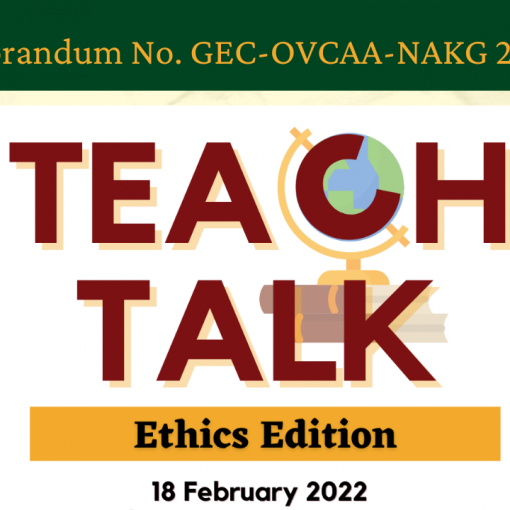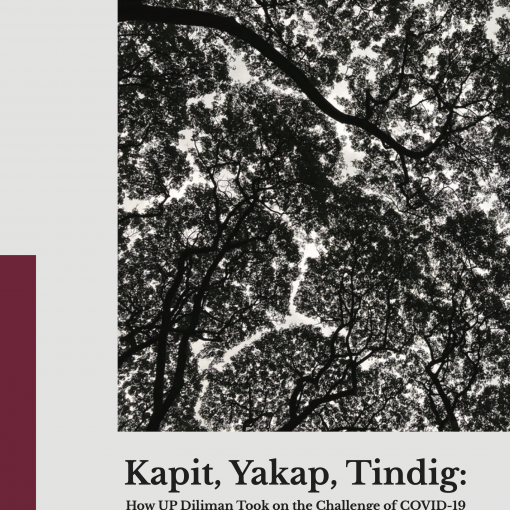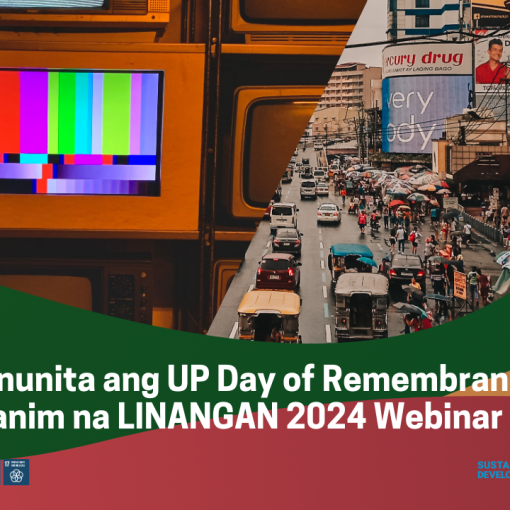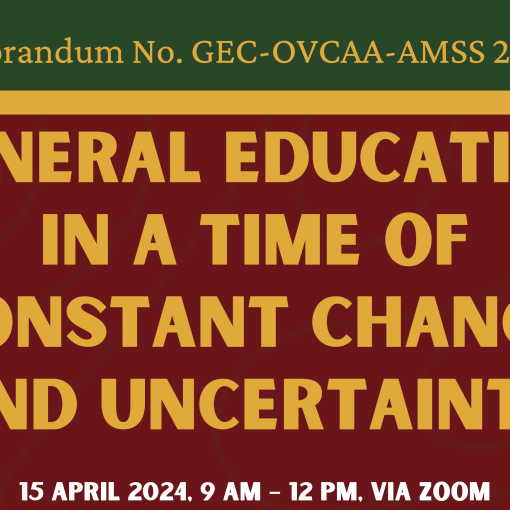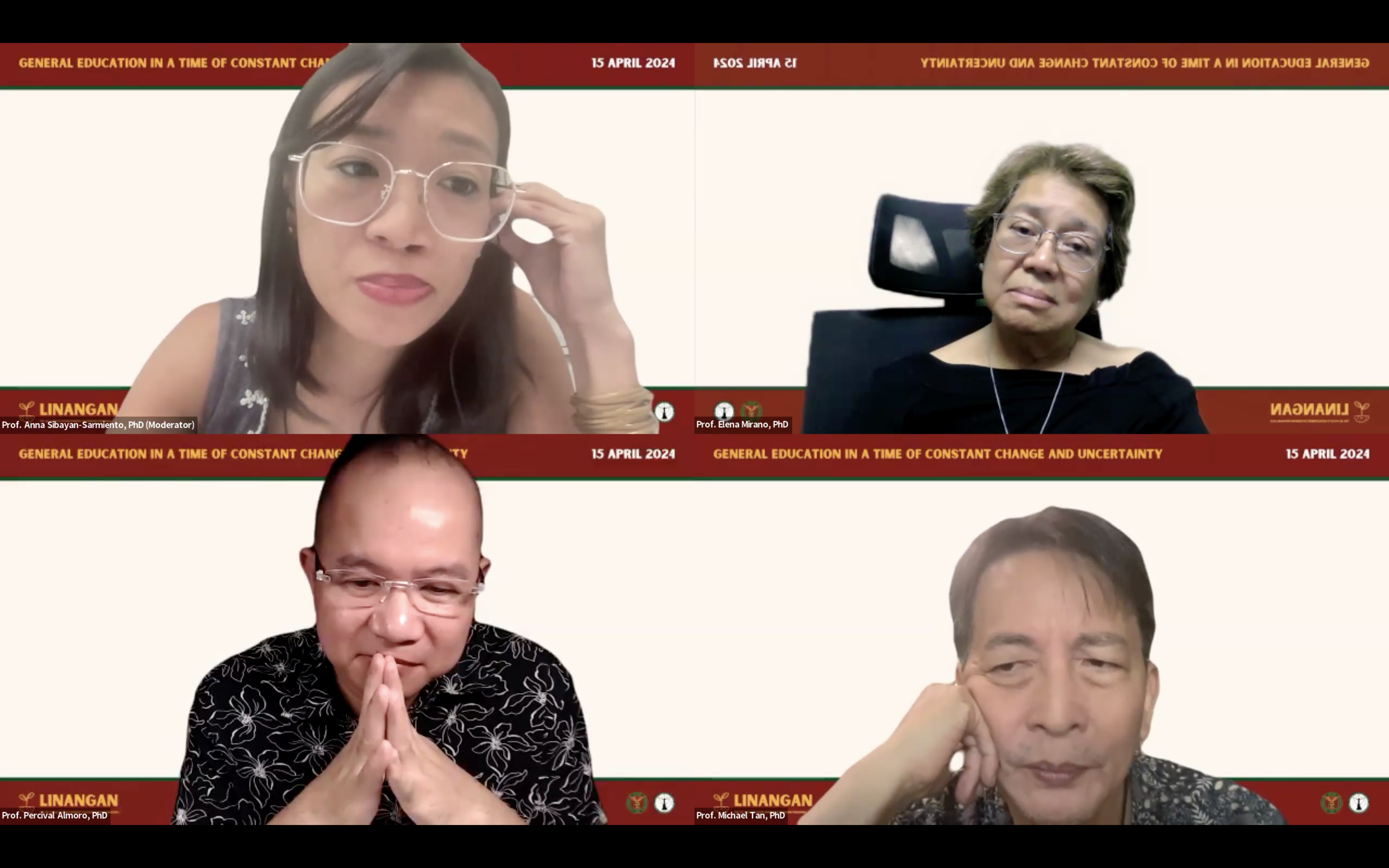
LINANGAN: The GE Faculty Development Extension Program, whose first successful run was from 2021 to 2022, is back again this 2024 with the introductory webinar, General Education in a Time of Constant Change and Uncertainty, which was held last 15th of April via Zoom and YouTube. The webinar, featuring three distinguished speakers from the domains of Arts and Humanities, Social Sciences and Philosophy, and Mathematics, Science, and Technology, discussed the role of General Education in a constantly changing and uncertain world.
To formally open the program, UP Diliman Chancellor Edgardo Carlo L. Vistan II and Vice Chancellor for Academic Affairs Maria Vanessa P. Lusung-Oyzon delivered their speeches, with Chancellor Vistan emphasizing that the continuation of LINANGAN is in fulfillment of UP’s mandate as well as GEC’s commitment to serve the academic community nationwide, and with Vice Chancellor Lusung-Oyzon foregrounding how we educators are all brought together by LINANGAN and ultimately by our common goal as educators to cultivate the Filipino youth. The opening remarks concluded with a preview of the upcoming LINANGAN webinars.
The first speaker of the webinar was former College of Arts and Letters Dean Elena R. Mirano. Her discussion centered on the dramatic yet necessary shift in approach and understanding of GE from the late 1950s to the contemporary period as educators gained experience and insight from the needs of the times and the needs of the students. She charted the evolution of arts education in UP Diliman, presenting the GE course ARTS 1 from its early days as Humanities 1 up to the present, from a very Eurocentric approach of art appreciation to an active engagement with art within our local contexts. She underscored that GE in the Arts and Humanities, through the use of inter-, multi-, and transdisciplinary methods, is a venue for us educators to help our students go from passively consuming art to using art to understand each other as humans.
Next was former UP Diliman Chancellor Michael L. Tan. He argued how GE in the Social Sciences and Philosophy is a space where we invite our students to examine the beliefs that we subscribe to and realize that we have agency to make society more humane, more accepting. He emphasized the role of GE in responding to dehumanizing issues such as essentialism and neoliberalism, and in combating despair which he implicated as the most serious problem in today’s society. He further argued that for us to be more humane and accepting we must first find ways to understand ourselves, and for as long as we have this desire to understand ourselves and each other, there is hope. Concluding his talk, he called for GE faculty to be conscious of the way they teach and to always make room for students to critically think and come up with answers for themselves.
The final speaker was Professor Percival F. Almoro, the current UP System Assistant Vice President for Academic Affairs (Research), who stressed on the relevance of GE in a research university, as it provides well-rounded training in generation and utilization of knowledge. In his talk he illustrated how, in the GE course Physics 10, discussions on scientific theories depart from the human experience. He explained the importance of understanding the struggles of scientists that led to their discoveries, and as such, the importance of experience in developing the competencies that we educators wish to develop in our students: interdisciplinary collaboration, critical and innovative problem solving skills, the courage to challenge “truths.”
After the discussions came the open forum. Salient questions include: how GE faculty can instill an appreciation of GE courses at a time when students question their value, how GE courses can be decolonized, how GE faculty can teach critical thinking, and what evaluation methods should be utilized. Though 45 minutes were allotted for the open forum, it was evidently insufficient to accommodate the lively conversation shared by the esteemed guest speakers and the many questions that were waiting to be answered.The UPD GEC extends its gratitude to all those who made the success of the first LINANGAN webinar possible. Building on the accomplishments and reach of the previous program, this year’s LINANGAN aims to further enhance the teaching and learning of General Education by creating a space for sharing and exchanging the teaching methods and techniques employed by UP Diliman GE faculty to integrate pressing contemporary issues on four major themes: artificial intelligence, gender mainstreaming, critical production/consumption of information, and disaster risk management. Interested participants may check GEC’s webpage on LINANGAN for details on LINANGAN and to register for the webinar they would like to attend. Meanwhile, those who did not catch the first webinar may still watch the live streaming on GEC’s YouTube channel.

